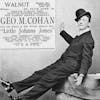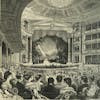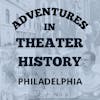© Podcast text copyright - Peter Schmitz. All rights reserved.
George Washington was in the audience.
Every actor in the company knew it. The playwright, William Dunlap, kept a nervous eye on Washington. He knew that a character in his new play, Darby’s Return, was about to tell a joke that involved the newly-installed President, who had just been escorted to his special box with much ceremony.
Washington, who had looked grave when his name was first mentioned in the text, heard the joke - and then burst into a hearty laugh. Dunlap relaxed, the cast relaxed, the soldiers standing guard at the theater’s doors relaxed, the whole audience relaxed. That night at the Old South Street Theatre in Philadelphia in November of 1789, everyone was having a marvelous time.
Fast forward ten years to a December night in 1799. A man stands on Chestnut Street. The news has just arrived from Mount Vernon that George Washington is dead. But what’s more on his mind right now, what’s literally blazingly evident, is that the new theater building he invested 20,000 dollars in - is burning down. He has no fire insurance policy. Philadelphia’s volunteer fire companies arrive, and start hand pumping the water pressure up in their engines. Their leather hoses soon begin to spray over the rising flames, as the audience members and actors and horses flee in terror . . .
Forward again to March 4th, 1863. In Civil War Era Philadelphia, the manager of the Arch Street Theater, the recently widowed actress Lousia Lane Drew, stands in her office, noting the excellent receipts that the new star performer of her company has brought in. On stage, that new star - the devilishly handsome actor John Wilkes Booth - is taking his bow in the costume of his character Richard III , drinking in the applause of the crowd, many of them Union soldiers. He is imagining even larger triumphs - perhaps the Confederate Army that he desperately hopes will soon be making its way towards Pennsylvania. Perhaps someday, very soon, oh he’ll be performing again in Philadelphia, but this time for a crowd of officers in gray uniforms. He’d love to do something to make that happen, in some theater, somewhere. . . .
Forward again to January 29th 1887, another actor stands on another Philadelphia stage - the Academy of Music, the grandest performance space in the entire city. He is also playing Richard III, but this actor is different from John Wilkes Booth. Very different. In fact this actor is John Wilkes Booth's worst nightmare - an African-American man, holding power and sway over the packed audience filling the house in front of him. And that audience, dressed in their finest clothes and proudly watching the man onstage, filling the Academy of music to its highest seats, is themselves almost entirely African American. He looks at them, he opens his mouth, and speaks his first line: “Now is the winter of our discontent/ Made glorious summer by this Sun of York . . “ . . .
We keep moving forward, quickly stopping for snapshots. Moments in time.
1908 - An excited audience of wealthy opera fans rushes from the Academy of Music and speeds up Broad Street to the grand opening performance of another enormous new opera house in North Philadelphia . .
1928 - Actors gather backstage at the palatial new Erlanger Theater on Market Street, all ready for the big opening number of a show on its way to Broadway. . .
1968 - Philadelphia police arrive at the small Theater of the Living Arts on grungy South Street. They go inside and haul out the artistic director Andre Gregory. They drive him to New Jersey, push him out of the car, and tell him to go back to New York. .
1974 - The producer Joe Papp and the playwright David Rabe stand on steps of a small converted church on Lombard Street, yelling at each other at the top of their voices. They both seem ready to start punching. The company of the play that Rabe wrote - the one Joe Papp just walked out on - file by, on their way to make an entrance through the audience, wide-eyed at the angry scene playing out in the lobby.
Oh there’s lots of stories like that about theater in Philadelphia.
And I’d like to tell you all of them.
[AITH OPENING THEME MUSIC]
Welcome and welcome (and welcome again!) to the introductory episode of Adventures in Theater History: Philadelphia.
My name is Peter Schmitz, and I will be the host, the narrator, the interviewer, researcher, the Chief Cook and Bottle Washer of this podcast series. I’m the one who came up with the title Adventures in Theater History. Just because I liked the sound of it, to be honest.
I wanted to do a podcast about theater history, and use it as a platform to make a public record and share some of the theater history research I’ve been personally doing lately. Like many history podcasters, I just like Explaining Stuff. I call myself an “insufferable know-it-all-smarty-pants, and while that’s a bit of self-deprecating humor, I guess it’s not too far from the truth, really.
Oh and yeah I’m spelling it Theater with an ER not at RE. Because that’s what Noah Webster did, when he wrote his first American dictionary. I love the Brits, but I’m not British, and I don’t need to follow the lead of 18th century English lexicographers who wanted everyone to know the word came from the Latin word theatrum. I don’t see the point, and neither did Mr. Webster. So: Theater. That’s my call, and I’m sticking with it. Here I am.
Working along with me on this project is Christopher Mark Colucci. Chris has much more credibility as a longtime Philadelphia theater guy than I do, and in fact is one of the best sound designers working around here. He has more Barrymore Awards (the local annual Philadelphia theater award) than you can shake a stick at. Don’t shake sticks around Chris, I mean it. The Barrymores will have to have a word with you about it, if you do.) I have worked on many shows with Chris where I was a dialect coach and he was the sound designer, composer, musician . . . and I’ve been in the audience for many many more. His reputation is legendary and well-deserved. You can hear some of his music on Soundcloud, if you want. Or even better yet, you can hear them in Philadelphia’s theater productions all over town.
Chris is the one who has written the theme music, and done the sound mixing and so much of the design and production work on this podcast. I’m honored to have him as a friend and as a colleague. And if this podcast sounds professional and slick at all - well that’s due to Chris. I literally could not have done it without him.
But okay, before I wrap this introductory episode up. . . Philadelphia people are passionate about their city (both positive and negative), and there are legions of local historians who can tell you its Deep History, its secrets and its successes. It’s a complicated and complex place, alternately dynamic and driven, and then sometimes divided, dull, and deluded. It can be quite secretive and parochial, and then at other times open and international and welcoming.
When I arrived here I quickly learned that there were many local customs and habits and things that you were Just Supposed to Know and were Never Explained (like, say, why you can park in the middle of Broad Street in South Philadelphia, which is technically illegal but not really . . or when to call the town “Philly” and when definitely NOT to). It can also be astoundingly warm-hearted and open. Once somebody decides they like you around here, they like you - I mean they REALLY like you. They will be on your side, forever.
Philadelphia was founded by devout and idealistic Quakers, some of the most Consciously Peaceful people in the world, and Philadelphia has much in it that is gracious and elegant and welcoming, as a result. But at the same time those Quakers were often Hard Men of Business, and they weren’t much interested in dancing and music or theater, and they were involved in the Trans-Atlantic slave trade, too. I’m hardly the first person to point out that the City of Brotherly Love has also become an often violent and terrifying place to be. Like many seaport cities, it has always been full of burgeoning immigrant and vibrant international communities, and yet it has also been a center of resistance to change by embedded power elites.
Though many actors and playwrights came from around here - a lot, really - few of them stayed put. Quite recently, as we shall eventually see, however, this has started to change. It’s very exciting. For the last few decades an astounding number of theater artists - actors, writers, directors, designers, techies, stagehands, have not just COME from Philadelphia, but have STAYED here or MOVED here - and made Philadelphia their home and built theatrical institutions.
Even as I record this now, it is filled with talented people who love the theater, love to attend the theater, love to make theater and go to dance and concerts and shows - and yet it is not a city whose reputation is based upon its creative classes. You probably think about its sports teams, and about their legions of local devoted fans here, maybe you think about its terrific Art Museum - and the steps, right? - before you think about theater and Philadelphia. Part of that is because ever since the early 19th Century, Philadelphia was outstripped in population and wealth and cultural prominence by New York City, the city just ninety miles to the northeast, the leading force in national theater was always Over There, not Over Here - and Philadelphia knew it. Inevitably, we’re going to be spending some time talking about theater in New York and elsewhere in the world, too. . . .
But I’m here to tell you - literally here to tell you - that there’s a story to be told about the history of the theater and performance in the city of Philadelphia, and it’s a fascinating and rewarding one. I’ve had a delightful time learning about it - researching it and uncovering it. And that theater history did not happen in a vacuum, it happened in the midst of all that revolution and violence and creativity and idealism and greed and corruption and urban expansion and cultural conflict. The history of the theater in Philadelphia is so deeply tied to so many other political and societal and racial and cultural stories, you can not separate them. And so I won’t. In fact, I don’t even want to.
Thank you again, Chris Colucci, for the theme music you’ll hear during the episodes and before and after the episodes. My plan is to make this a multi-episode podcast with projected fifty episodes. But maybe there will be more, or less. I can’t quite tell yet. Like a lot of journeys, you’re pretty sure how long it’s going to take, but you never really know. So, we will see. I can tell you definitely that the first five episodes of the show we’re releasing all at once, and after that we plan to release another episode about every two weeks. If that plan changes, we’ll let you know.
In the next episode, I’ll do a general overview of the history of the theater in early Philadelphia, up through the end of the 18th Century. And after that very Serious and Important work, well hey we all deserve a break - so we’re going to go to the circus.
Thanks for listening. If you’d like to support the show and the work I’m doing, there’s a Patreon account set up: Adventures in Theater History. There’s also an email account: AITHpodcast@gmail.com. That’s where to find me if you have questions or corrections. There’s my longtime Twitter account @schmeterpitz, where you can see more info about the show, and where I post regularly about Theater History topics. There’s so many ways to be in touch!
See you at the next episode.
Here we go!
[AITH END THEME]
© Podcast text copyright - Peter Schmitz. All rights reserved.









